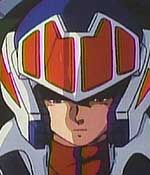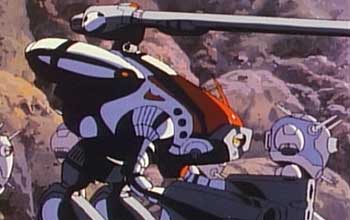by Len Cutler
"What you see is what you get." Those six words offer a quick glance into one of life's little truths. And it's
usually pretty accurate. But once in a while, life throws you a curve. Sometimes, what you see isn't even close...
you get a lot more.
Like many of you, I grew up with "Robotech." Those sunny afternoons spent with Rick Hunter and company opened my
eyes to a world in which cartoons were richer, fuller, and more complex than anything coming out of Castle Greyskull.
It's fair to say that for most, "Robotech" was our introduction to anime. And even though we didn't know it at the
time, we were the first wave of a revolution: "Macross" opened the gates, uncapping a torrent of images and stories
that continue to enthrall and entertain American audiences everywhere.
From "Battle Angel" to "Princess Mononoke," the proliferation of anime titles in America owes a lot to "Robotech."
But the story behind the series isn't what you'd expect. The circumstances leading to the series' creation is a
fascinating chapter in the evolution of American anime.
Now on the cusp of Robotech's re-release, Akadot celebrates the event by speaking with the man responsible for
bringing the series to American television, Carl Macek. We started off the conversation with a few questions about
some of the technical aspects of the series. Macek didn't create the series from scratch. In a sort of creative
experiment, the television broadcasters gave Macek the unenviable task of creating the "Robotech" series out of video
footage from three separate, previously released Japanese anime television series, "Super Dimension Fortress Macross"
(dubbed "The Macross Saga" by Macek), "Super Dimension Cavalry Southern Cross," (titled "The Robotech Masters"), and
"Genesis Climber Mospeada" ("The New Generation"). I asked Macek how the project unfolded.
"What happened was 'Robotech' was acquired like most anime is today: As existing programming," Macek explains.
"It was derived from three separate television series. Because of that, the animation was already in place."
He redubbed the sound, altered the story line, and crafted a whole new narrative world based somewhat on the
themes and ideas established in the original "Macross" - but the raw materials, which had few common elements with
which to work, awaited cohesion. "What I did was look at footage from the three shows that we chose to include in
'Robotech.' I watched them without sound, scripts or cues as to what they were really about."
It's an interesting proposition: imagine having to create a single sci-fi television series out of old Buck
Rogers, Star Trek, and Battlestar Galactica reruns. Most would probably approach it as an artistic exercise - a
collage for the digital generation. But for Macek, the finished product had to be more than just entertaining and
creative. It had to make sense. So how did he come up with the "Robotech" of today?
"One of the problems from the storytelling of the original sequence was that the aliens were supposed to be
scared of music and culture; that to me did not seem to me like a realistic criteria for them to be defeated," Macek
continues. "But there was a word I kept hearing: 'Proto culture' - they had it as two words - which meant 'pre-culture'
or the origins of culture. In the Japanese version these aliens were created in a test tube, without any exposure to
art or music - they were bred to be warriors. And when they heard music, it freaked them out. So Minmei singing at the
front of a battleship was not merely an inspirational tactic like it was in 'Robotech' - it was actually a secret
weapon. And I just didn't think that would be effective for storytelling in the United States. So I had to come up
with a solution, and the word 'proto culture' kept bugging me. Eventually I came up with a completely original idea,
made it into one word, and based the story around a quest for this power source and its origins."
|


